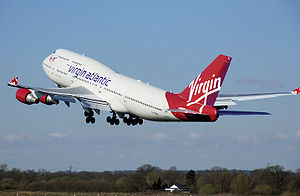It is commonly accepted that necessity is the mother of invention. Although no father has come forward, the British believe the sire to be Sir Richard Branson. From Virgin Records to Virgin Atlantic, to Virgin Galactic — and now to Virgin Fuel s— 61-year-old Branson has been driven, he says, “[by] setting myself huge, apparently unachievable challenges and trying to rise above them.”
So it comes as no surprise that, on October 11, Virgin Atlantic announced the development of a world-first low-carbon aviation fuel with just half the carbon footprint of the standard fossil fuel alternative.
The fuel — which is expected to power Virgin Atlantic flights on its routes from Shanghai and Delhi to London Heathrow, beginning in two to three years — is the result of a ground-breaking partnership with New Zealand-based clean-technology firm LanzaTech. The revolutionary production process recycles waste gases from industrial steel production — capturing, fermenting, and chemically converting them using Stockholm-based Swedish BioFuels’ technology. From there, the ethanol is transformed into a synthetic, aircraft-ready “drop-in fuel” that would be blended with conventional jet fuel in a 50:50 mix.
Without this development, the waste gases would be burnt into the atmosphere as carbon dioxide (CO2).
Virgin Atlantic will be the first airline to use this fuel and will work with LanzaTech, Chicago-based aerospace contractor Boeing and Swedish Biofuels toward achieving the technical approval required for using new fuel types in commercial aircraft. A ‘demo’ flight with the new fuel is planned within one year to18 months.
Should the partners jump those hurdles, the rewards could be great. Sir Richard said he believed the green fuel in development could come in at about the same price as conventional aircraft fuel. Virgin has agreed to buy the fuel but is not an investor in either company.
“In a nutshell, what we’ve gone into is the recycling business,” said the Virgin Airline founder, noting that, “Virgin was an early innovator, flying the first commercial jet using a biofuel blend in 2008 – although no paying passengers were on board.” At that time, the fuel was made from a mix of coconuts and Brazilian babassu nuts.
LanzaTech estimates that its process can apply to 65 percent of the world’s steel mills, allowing the fuel to be rolled out for worldwide commercial use. The technology is currently being piloted in New Zealand. A larger demonstration facility will be commissioned in Shanghai this year, and the first commercial operation will be in place in China by 2014.
Aviation is responsible for an estimated two percent of human-generated carbon dioxide emissions. The industry’s rapid growth is doing nothing to decrease that figure, but airlines are nonetheless working to scale back their emissions. In June, KLM announced that it would begin operating more than 200 flights using biofuel in September. In July, LufthansaFinnair, and Thomson Airways launched their bio-fueled flights. And in August, Aeromexico flew what it called the first biofuel-powered transcontinental commercial flight. Among major U.S. carriers, those that made commitments to biofuel as of June 2011 include American Airlines, United Continental Holdings, Alaska Airlines, FedEx, JetBlue Airways, Southwest Airlines, US Airways, and Frontier Airlines. ,
Speaking as he announced the partnership today, the President of Virgin Atlantic, Sir Richard Branson, said,
“We were the first commercial airline to test a bio-fuel flight and we continue to lead the airline industry as the pioneer of sustainable aviation. This partnership to produce a next generation, low-carbon aviation fuel is a major step toward radically reducing our carbon footprint, and we are excited about the savings that this technology could help us achieve. With oil running out, it is important that new fuel solutions are sustainable, and with the steel industry alone able to deliver over 15 billion gallons of jet fuel annually, the potential is very exciting. This new technology is scalable, sustainable and can be commercially produced at a cost comparable to conventional jet fuel.”
Branson added, “Virgin Atlantic believes that this development will take the airline well beyond its pledge of a 30 percent carbon reduction per passenger –kilometer [a measure of distance] by 2020. The investment in renewable fuels is part of our wider program to reduce carbon through measures such as using new, more fuel-efficient aircraft and supporting a global carbon cap and trade scheme, through our involvement in Aviation Global Deal group.”
Bookmark this page for “renewable aviation fuels” and check back regularly as these articles update on a very frequent basis. The view is set to “news”. Try clicking on “video” and “2” for more articles.








